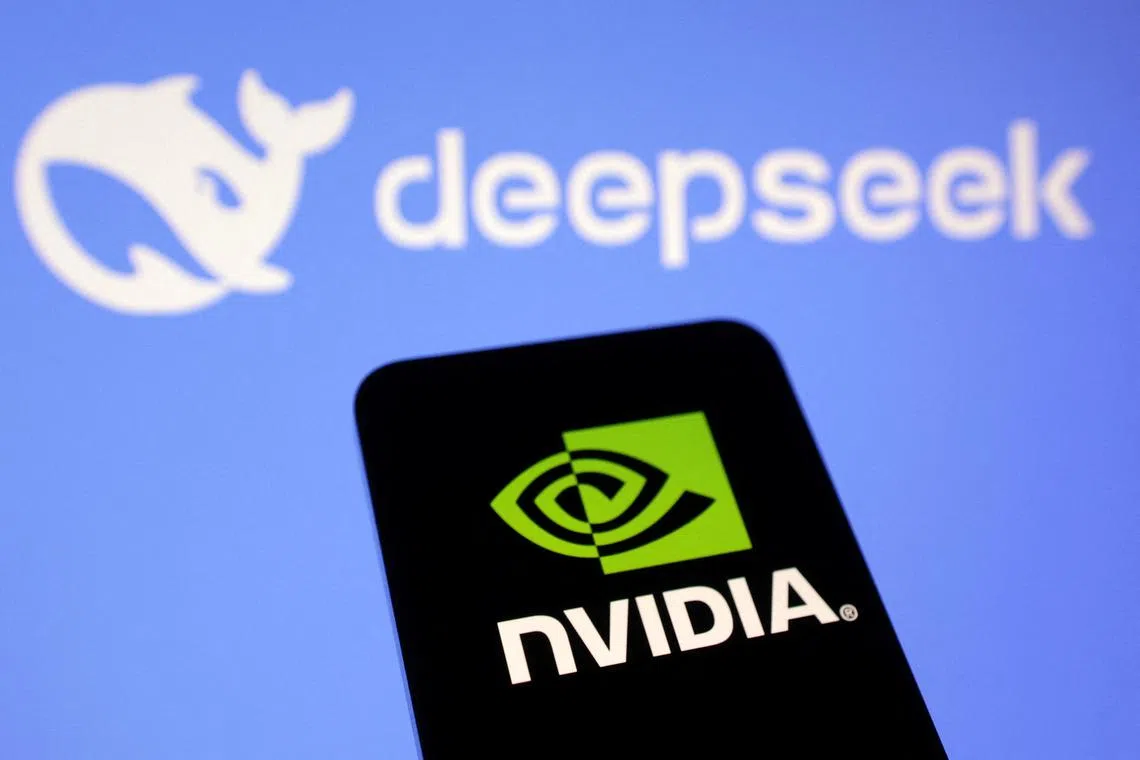Nvidia sheds $792 billion of market value in DeepSeek rout, biggest one-day loss in US history
Sign up now: Get ST's newsletters delivered to your inbox

DeepSeek’s low-cost approach reignited concerns that US tech giants like Nvidia have poured too much money into developing AI.
PHOTO: REUTERS
Follow topic:
NEW YORK - Nvidia’s share plunge, fuelled by investor concern about Chinese artificial-intelligence (AI) start-up DeepSeek, erased a record amount of stock-market value from the world’s largest company.
Nvidia’s shares tumbled 17 per cent on Jan 27, erasing US$589 billion (S$792 billion) from the company’s market capitalisation. That eclipsed the previous record – a 9 per cent drop in September that wiped out about US$279 billion in value – and was the biggest in US stock-market history.
The drop rippled through the rest of the market due to how much weight Nvidia has in major indexes. Including Jan 27’s slump, Nvidia sell-offs have caused eight of the top 10 biggest one-day drops in the S&P 500 Index, based on market value, according to data compiled by Bloomberg. The S&P 500 fell 1.5 per cent on Jan 27 and the Nasdaq 100 tumbled nearly 3 per cent.
The semiconductor maker led a broader sell-off in technology stocks after DeepSeek’s low-cost approach reignited concerns that big US companies have poured too much money into developing AI. The Chinese firm appears to provide a comparable performance at a fraction of the price.
The latest AI model of DeepSeek, released last week, is widely seen as competitive with those of ChatGPT’s OpenAI and Facebook’s Meta Platforms. The open-sourced product was founded by quant-fund chief Liang Wenfeng and is now at the top of Apple’s App Store rankings
“Concerns have immediately emerged that it could be a disruptor to the current AI business model, which relies on high end chips and extensive computing power and hence energy,” Jefferies analysts said in a note to clients.
Nvidia has been the biggest beneficiary of the influx in spending on AI because it designs semiconductors used in the technology. While that heavy spending looks poised to continue, investors may grow wary of rewarding companies that are not showing a sufficient return on the investment.
Meta announced plans on Jan 24 to boost capital expenditures on AI projects this year by about half to as much as US$65 billion, sending its shares to a record high. That came on the heels of OpenAI, SoftBank Group and Oracle announcing a US$100 billion joint venture called Stargate to build out data centres and AI infrastructure projects around the United States.
In a bid to stall China’s progress in AI, the US has banned the export of advanced semiconductor technologies to the country and is limiting sales of advanced Nvidia AI chips to others. But DeepSeek’s progress suggests Chinese AI engineers have found a way to work around the export bans, focusing on greater efficiency with limited resources.
Nvidia said in a statement on Jan 27 that DeepSeek’s model is an “excellent AI advancement” and indicated that the Chinese company did not violate US restrictions that limit access to advanced US chips in creating its technology. It also added that inference, or the work of running AI models, “requires significant numbers of Nvidia GPUs and high-performance networking”. BLOOMBERG

